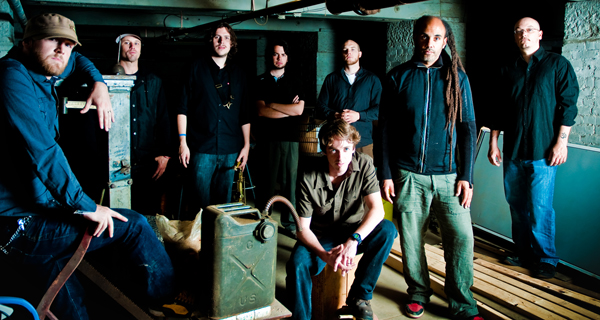
John Brown’s Body has been churning out music for nearly a decade now, and the band’s sonic evolution, growing from a more traditional roots reggae band into some futuristic vision of the shape of dub to come, combines roots, dub, hip-hop, and techno, among other genres. Late one night, after a dope performance from the group at Manhattan’s Gramercy Theatre, The Pier caught up with drummer Tommy Benedetti in the venue bar to discuss the band’s history, both recent and distant, as well as plans for the future.
The Pier: So first and foremost, have you guys been working on any new material?
Tommy: Yes. At the end of summer we went into the studio in New York and hashed out a bunch of tunes that Elliot [Martin, the band’s lead vocalist] had written. We also documented a bunch of dubs and instrumentals that we were playing in the set for a while. You heard a couple tonight. One is called Empty Hands and one is called Searchlight. Those have been in the set for probably four months, so we’ve taken them around the country a time or two. And they’re feeling great, sounding great.
I think after we get done with this bunch of touring we’re gonna do another session and kick another batch. But it’s always a long process for us. Recording records ends up taking a while because of our touring schedule, but we’re moving along.
The Pier: Do you guys usually road test songs before recording them?
Tommy: Yeah, pretty much. Eliot will bring close to a finished product to us. He’ll build a tune close to 100%. He brings it to us and we may tweak things here and there – beats, basslines, horn lines – and then once we get it up and running and feeling really good we take it to the stage and then it just stretches from there and morphs into something that we’ll eventually record.
 The Pier: John Brown’s Body is frequently described as a future roots band. How do you feel about having futuristic connotations attached to your music in a genre that normally so steeped in tradition?
The Pier: John Brown’s Body is frequently described as a future roots band. How do you feel about having futuristic connotations attached to your music in a genre that normally so steeped in tradition?
Tommy: I think we are steeped in tradition as well. The future roots tag, if you break it down, it’s being reverent to the things that came before us, which we love so much and were inspired by for many, many years now. But, also, it’s our duty as musicians in 2010 to put our own spin on it and take the music forward just like Burning Spear did back in the 1970’s, just like Bob Marley did, just like the gladiators did. All the greats that we love took the music forward and now it’s our turn to take the music forward.
John Brown’s Body started off as a more traditional roots sounding band. Then it evolved over the years like any working band should and does. It hasn’t been a calculated evolution; it’s just been a natural thing. We’re just playing the music that we love to play. People call it what they want or put a tag on it – everybody loves to do that. We just want to play music we love. We love old school reggae, but I love Cut Chemist and I love Slayer and I love Wilco. so it’s like I don’t give a damn what people call it really. We just want to play the music that we love to play.
The Pier: During your performance, I noticed that while you guys definitely sound well rehearsed, the music did have some of those gaps and looser periods within tracks that come from spontaneous improvisation within the band, although John Brown’s Body certainly isn’t a jam band. Could you elaborate a bit on how the band approaches live performances?
Tommy: We love playing music together, man. We love strechin’. A bunch of us live in Boston and we play music together a lot in town in different formations. We’ve been playing together for a while, and we love stretchin’ things and we pride ourselves on having really big ears. When the moment arises, people know what to do at the right time.
Everybody takes their shot at the proper time. With an 8-piece band everybody can’t be stepping all over everybody. Everybody’s gotta have big ears and you gotta listen and you gotta react. We’re all just reacting to things going on onstage. We’ve been playing long enough, or we’re fortunate enough, to be able to just work off each other.
The Pier: That’s particularly impressive considering the band has undergone several line-up changes. How long has the current band formation been together?
Tommy: There’s been a bunch of line-up changes, but the core of this band has probably been together since 2006. A couple of the horn players are a little bit newer, maybe a year and a half. Actually, we just got a new keyboardist, JP too, but our guy Matt was with us for like four years.
It’s a really solid core right now and I don’t see it changing. It’s very comfortable and we really have a great family environment. We love traveling the world and playing music. We spend a lot of fucking time together, man. We love it! I think that’s why the music keeps evolving and keeps sounding so fresh.
The Pier: Final question: where did you guys get the name John Brown’s Body?
Tommy: One of our former singers, Kevin Kinsella, wrote the majority of the tunes on the first three JBB records. He was a real history buff, and he was real into John Brown and the whole vibe of him being like a kind of on the edge, crazy-lookin’, bearded white dude that was just willing by any means necessary to just turn shit over and fight for what he thought was right and taken down stuff he didn’t think was right…
[Writer’s Note: Just to make sure we’re all on the same page here, John Brown was a pre-civil war radical abolitionist who encouraged and participated in violence and armed insurrection as a means of ending slavery in the U.S. He has been called “one of the most perceptive human beings of his generation” and “the father of American terrorism.”]
…I think Kevin saw a similarity. We were just doing what we though was right for us musically, doing what we love to do. We love the story of John Brown. We thought it’s an under-told story, and we thought the name was something we could really make our own. When you hear John Brown’s Body it doesn’t say reggae band. It doesn’t say pop band. It doesn’t say metal band. It’s just something that we could kind of craft our own kind of world around.
It’s a great story. He’s a really interesting figure to look up for anybody that doesn’t know about him.
The Pier: Alright, thanks for sitting down with me tonight Tommy. I don’t have any other questions, but is there anything you would like to add before I turn off the recorder?
Tommy: I love The Pier! Come out and see us anywhere in the US or beyond. The Pier has always been kind to us and we really appreciate the support.
– Interview by: Chris Castro

